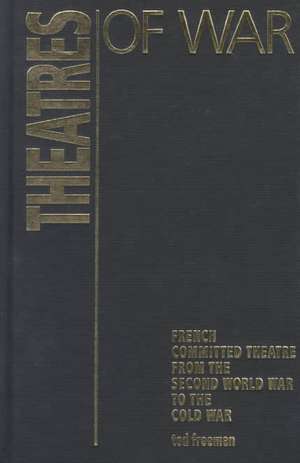Theatres Of War: French Committed Theatre from the Second World War to the Cold War
Autor Ted Freemanen Limba Engleză Hardback – 31 dec 1997
Theatres of War is the first full-length study to be devoted to the 'Committed' theatre that flourished in modern France from 1944 to the mid-1950s. During this crucial decade, authors such as Sartre, de Beauvoir and Camus, along with other lesser-known dramatists, responded to the issues of their time by contributing a number of tense controversial plays to a distinctive genre of realist theatre. These plays dealt with the ideological, political and moral issues arising from the Second World War, the Cold War and a series of disastrous colonial wars.
Theatres of War combines historical contextualisation, pointing up the political and moral debate of the theatre of the period, with detailed analysis of specific plays, making it a useful student text. All quotations are in French with English translations immediately following.
Preț: 489.42 lei
Preț vechi: 617.04 lei
-21% Nou
Puncte Express: 734
Preț estimativ în valută:
93.66€ • 97.23$ • 78.10£
93.66€ • 97.23$ • 78.10£
Carte indisponibilă temporar
Doresc să fiu notificat când acest titlu va fi disponibil:
Se trimite...
Preluare comenzi: 021 569.72.76
Specificații
ISBN-13: 9780859894852
ISBN-10: 0859894851
Pagini: 256
Ilustrații: illustrations
Dimensiuni: 234 x 152 x 23 mm
Greutate: 0.52 kg
Ediția:1
Editura: UNIVERSITY OF EXETER PRESS
Colecția University of Exeter Press
Locul publicării:United Kingdom
ISBN-10: 0859894851
Pagini: 256
Ilustrații: illustrations
Dimensiuni: 234 x 152 x 23 mm
Greutate: 0.52 kg
Ediția:1
Editura: UNIVERSITY OF EXETER PRESS
Colecția University of Exeter Press
Locul publicării:United Kingdom
Notă biografică
Ted Freeman is Senior Lecturer in French, University of Bristol. He is the author and editor of many books.
Cuprins
The following plays are given detailed treatment in Theatres of War:
Toulon (Jean-Richard Bloch)
Les Nuits de la colère (Salacrou)
Morts sans sépulture, Les Mains sales (Sartre)
Les Bouches inutiles (Simone de Beauvoir)
Montserrat (Emmanuel Roblès)
Les Justes (Camus)
Rome n'est plus dans Rome (Gabriel Marcel)
La Maison de la nuit (Thierry Maulnier)
Le colonel Foster plaidera coupable (Roger Vailland)
La Peur (Georges Soria)
Toulon (Jean-Richard Bloch)
Les Nuits de la colère (Salacrou)
Morts sans sépulture, Les Mains sales (Sartre)
Les Bouches inutiles (Simone de Beauvoir)
Montserrat (Emmanuel Roblès)
Les Justes (Camus)
Rome n'est plus dans Rome (Gabriel Marcel)
La Maison de la nuit (Thierry Maulnier)
Le colonel Foster plaidera coupable (Roger Vailland)
La Peur (Georges Soria)
Recenzii
“But some literary works . . . acquire, as the years go by, a 'petite madeleine' quality that brings back, especially to those fortunate to have tasted them when they came out, the whole atmosphere of the period in which they were first produced. This is particularly true of several of the fifteen plays studied in this well-researched and impeccably documented book. . . Freeman brings the atmosphere of the late 1940s and early 1950s so compellingly back to life that I felt at times as though I was reading a particularly good historical novel.” –MLR, 94.3, 1999
“Weaving together theatrical, social and political history in a readable and informative way, Theatres of War is a useful guide to a neglected area of postwar French theatre history.” –Speech and Drama, Volume 48, Number 2 Autumn 1999
“Not only is this study a timely re-appraisal of French committed theatre at a crucial point in France's history (1942-54) from various political stances, it opens up the question of the didactic or realist nature of littérature engagée more widely. . . a thought-provoking and searching challenge to new and old devotees of French committed theatre and twentieth-century theatre more widely.” –Forum for Modern Language Studies, Volume 35, Number 4 1999
“Freeman's introduction succinctly places these dramas into their political and theatrical contexts and his concluding chapter offers a neat survey of the common characteristics shared by the plays of this genre, but it is primarily as a source book that his study will serve a purpose. The bulk of the study is documentation, rather than analysis, and as such it will be a useful addition to relevant reading lists. Its appearance will be of interest to scholars and students not only of Modern French Theatre, but of political theatre in general, and of the popular manifestation of political concerns, not to mention to those with specific interests in the dramatic worlds of Sartre and Camus . . . Each play is contextualised in terms of the particular event it was documenting or written in response to, or the political climate it sought to exploit, and each has a chapter dedicated to it that might easily be read in isolation from the rest of the book.” –Studies in Theatre Production, Issue 18, December 1998
